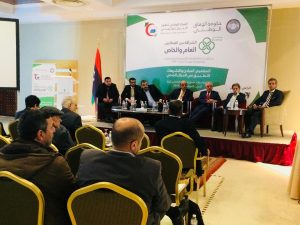On the 1st Jan 2019 the National Centre of Health System Reform had organized the PPP (Public-Private-partnership) Workshop based on the reference of The National Health Strategy Conference 2017, to discuss the basics of the PPP generally and the ability to apply it on the health sector in Libya.
The PPP Workshop day was divided in to two sections, each ended with a discussion and parted by a coffee break:
Section 1
The concept, Basis, Legislations:
- Mahmoud Fteasy ………………. The Concept Of Partnership
- Badr adeen Al-toumy …………. The Legislations For Partnership Enhancement
- Ahmed Zikry …………………….. Partnership Success Requirements
- Mohammed Raead ……………. Pros and Cons Of Partnership
- Maan Hamada …………………. The Partnership in A Mechanical Scientific Concept
Section 2
Implication of PPP on Health System:
- Aimen Seaf-Annasr ……………. The Reasons for Health System Partnership
- Dr . Ali Khaleel ……………………….. Service Charge in Both Public and Private sectors
- Talal Ajaj ………………………….. Health Insurance Role
- Randa Hamada …………………. Partnership International Attempts
- Bdr Adeen AbuHajar …………… Health System Partnership Envision
On behalf of NCHSR Dr. Hend Msalati had started the event by greeting the attendance after they listened to verses of the holy Quran and the national anthem and welcomed Dr. Samir Sagar to give a brief presentation on the Sensible Governance. .By that, the following lecturers have started their speeches of the workshop’s first section.
Ideas in this event were shared and PPP was discussed from different angles and fields. Presenters and guests contributed to the topic with international examples along with many original plans, they also assured that PPP at this point is a necessity not a choice especially when noticing the crisis of the public health system which led the private sector to control and monopolize the health field.
But the main reason behind this partnership is to guarantee luxurious sustainable health service to the patients, and since the partnership shifts the duty of the ministry from offering the service to supervision and observation this will defiantly lead to the precision and speed of projects accomplishment. But it can’t be denied that the limited number of contributors and the cost estimation difficulty are negative sides of this partnership.

The Outlines of the legal basis of the partnership were also laid out in this workshop and the need to empower the Libyan legislations depending on a national policy and plans was explained. As importantly, contributor’s rights such as currency exchange and sensible management should be outlined and guaranteed in this partnership for both parties.
The new perspective discussed in the event suggests that the health sector budget will be reorganized, instead of being government dependant it will receive its main budget from the Health insurance fund, insurance companies and national fund in general, while the 3rd levelled health service will stay directly under the funding of the government.
Even though there is many international examples for PPP such in Britain , France and Canada but the high service cost is still a letdown, and the Libyans both patients and partnership parties should have their country benefit as a apriority and move forward as soon as possible.
The workshop’s conversation lead to a conclusion of the necessity of ending the tense relationship between the private and public sectors and the importance of starting the cooperation between the two sectors in order to develop the health institutions in the country.

